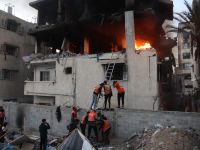US President George W. Bush took his place at a NATO summit for the first time Wednesday, hoping to win over fellow leaders of the 19-nation alliance to his ideas on missile defense.
Bush was expected to use the four-hour NATO meeting and working lunch to pitch to skeptical European allies his vision of a missile defense shield to guard against feared attacks from so-called "rogue states."
In opening remarks, Bush did not explicitly refer to the proposed missile shield, but said: "We must strengthen our alliance, modernize our forces and prepare for new threats."
European allies disagree on the degree of threat posed by the likes of North Korea and Iraq, the countries most often cited by Washington as potential perpetrators of a ballistic missile attack on the West.
They are also seriously concerned that Bush's plans would wreck the 1972 Anti-Ballistic Missile (ABM) treaty between Moscow and Washington -- a legacy of the Cold War that remains the keystone of global arms control and rules out the kind of missile defense shield Bush has proposed.
In Madrid Tuesday, Bush dismissed the ABM treaty as "a relic of the past," as it "prohibits the United States from investigating all possibilities as to how to intercept missiles."
French President Jacques Chirac was the first to express concern over Bush's missile defense ideas, his aides said. Chirac insisted on the need to "preserve the strategic balance," calling the ABM a "pillar" of this effort.
But he did not close the door on the notion of an anti-missile defense, the aides said. "France is ready to take full part in discussions" on the issue, he said -- BRUSSELS (AFP)
© 2001 Al Bawaba (www.albawaba.com)







